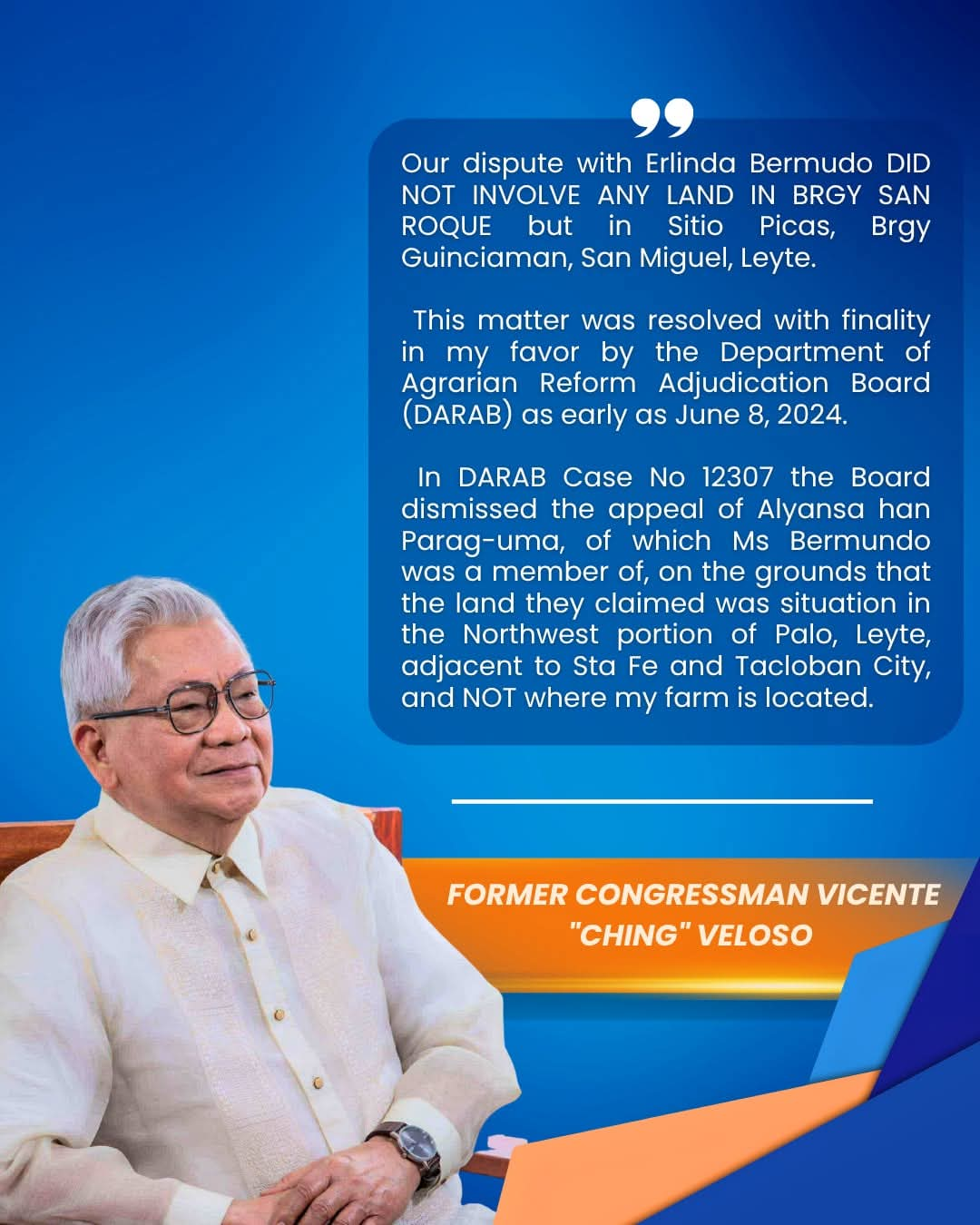by Miriam G. Desacada
TACLOBAN CITY — Former Leyte 3rd District Representative Ching Veloso has written a letter-complaint to broadcast journalist Jessica Soho, accusing her recent television documentary of airing misleading and erroneous claims imputing him to violations of law.
Veloso said the documentary tackled two issues: 1) An alleged overpriced farm-to-market road (FMR) project in Barangay San Roque, Tacloban City; and 2) he and his family grabbed lands surrounding the FMR site.
Both issues, in Soho’s documentary, portrayed him and his family of breaching the law—completely without taking his side—prompting him to air his complaint to the TV program host.
In his letter, a copy of which was furnished to the local media, Veloso denied any involvement in the questioned overpriced FMR. He clarified that the subject FMR project, which is in Tacloban City, falls under the First District of Leyte, far from his jurisdiction as Congress representative of the Third District of Leyte (2016-2022).
Veloso told Soho that he was no longer a House member in 2022, thus: “I am not in a position to explain how the FMR in Barangay San Roque, Tacloban City, which is pending construction, got an alleged P100 million appropriations,” he said.
Veloso shared to the local media, “That area (under the 1st District) is not even within my congressional jurisdiction (3rd District).”
He also refuted the documentary’s claim that he illegally occupied the lands surrounding the FMR, calling it Fake News. He cited the statement of the first person Soho interviewed, who said that “I (Veloso) bought the lands at a cheap price.”
This statement alone, Veloso said, was enough proof that he did not grab the lands because he bought them, notwithstanding the prevailing price at the time.
Another aspect on the land grabbing accusation was the statement of another Soho’s source, the second person Soho interviewed, identified as Erlinda Bermojo.
Soho took all of Bermejo’s words—hook, line and sinker—that Veloso grabbed her land around the FMR in San Roque, Tacloban.
Veloso said the Bermejo statement is “a blatant lie.” He clarified that the land dispute between him and Bermejo occurred a decade ago, but it was not about the land in San Roque, Tacloban but the one in sitio Picas, Brgy. Guinciaman, San Miguel, Leyte—two properties, five towns apart each other.
According to Veloso, the Department of Agrarian Reform (DAR) already resolved the Bermejo-Veloso land dispute in 2014, ruling in favor of his family.
Veloso cited the findings of DAR regional adjudicator Felixberto Diloy in 2002 that the land questioned by Bermejo and her organization (Alyansa Han Parag-uma Ha Sab-a Basin) was located in northwest of Palo town, adjacent to Santa Fe town and Tacloban City, which is very far from Veloso’s farm in San Miguel town that Bermejo had contested.
Alyansa and Bermejo tried to elevate the case to the DAR Adjudication Board (DARAB) Central Office, but on 8 June 2004, DARAB promulgated a decision dismissing the appeal of Alyansa and its members—Bermejo included—on the ground that the land they claimed as theirs is situated in “the northwest portion of Palo, adjacent to Santa Fe and City of Tacloban,” not the one in sitio Picas, Brgy. Guinciaman of San Miguel.
This DARAB decision “became final and executory on 28 July 2004,” said Veloso, adding that his dispute with Bermejo has been resolved by the government, in his favor.
With such decision with finality, Bermejo’s “fictitious claim against me has been a closed case,” declared Veloso in his letter to Soho.
Veloso, citing the DARAB documents as annexes to his stand presented to Soho, asked the popular TV host to “immediately correct the documentary report and avoid the rigors of a court action…”
Veloso told Soho further that he is now “being maligned by some media outlets, as a result of your report,” adding that clarification from both sides is necessary to prevent the spread of misinformation.
As of press time, GMA Network and Soho’s team have yet to state in response to Veloso’s complaint. —-Miriam G. Desacada

